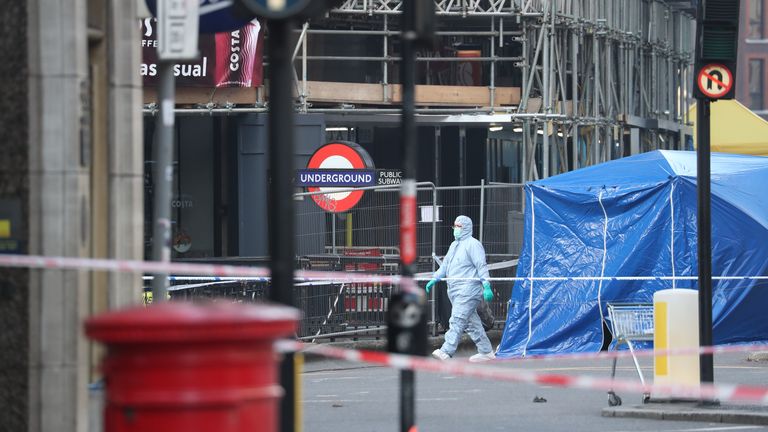London Bridge attack: Political row brews over Usman Khan's prison release
Home Secretary Priti Patel seeks to blame legislative changes by the last Labour government for the terrorist's early release.
Saturday 30 November 2019 22:55, UK
London Bridge killer Usman Khan's release from prison is brewing into a political row amid the ongoing general election campaign.
Home Secretary Priti Patel has sought to blame legislative changes by the last Labour government for the terror attacker's release halfway through his jail term.
She claimed laws introduced in 2008, under Gordon Brown's government, meant that "dangerous terrorists had to be automatically released after half of their jail term".
The cabinet minister appeared to be referring to the Criminal Justice and Immigration Act 2008.
This legislated for those handed a fixed-term prison sentence to be released automatically halfway through their sentence, and to be on licence until the end of their sentence.
Ms Patel highlighted how, in 2012, the Conservative and Liberal Democrat coalition government altered the law to introduce a new Extended Determinate Sentence for dangerous criminals with the aim of ending automatic release from prison halfway through their sentence.
However, the home secretary added: "Khan was convicted before this."
Security minister Brandon Lewis echoed Ms Patel's claim, also vowing the Conservatives "are going to fix this and ensure that people serve their full term".
Both ministers were responding to a series of questions posed by Labour's Yvette Cooper, who was chair of the House of Commons' Home Affairs Select Committee in the last parliament.
In a thread of Twitter posts, Ms Cooper, a former cabinet minister in Mr Brown's government, asked how Usman's early release "could be allowed to happen".
After highlighting how Imprisonment for Public Protection (IPP) sentences - indeterminate sentences reserved for criminals deemed to be too dangerous to be released - were abolished in 2012, Ms Cooper asked: "When the government replaced IPPs in December 2012 they claimed new arrangements would still protect the public. Why have they failed in this case?
"What assessment did the government make of the number of serious criminals or terrorists originally given IPPs who could be released early without any Parole Board assessment? How many other convicted terrorists are in this situation…"
In April 2013, judges at the Court of Appeal quashed Khan's indeterminate sentence - handed to him for terror offences in February 2012 - and instead set a fixed-term sentence of 16 years in prison, with a five-year extension period.
He was released at the halfway point of his 16-year term, including time spent on remand, in December last year.
Ms Cooper added: "When Appeal Court in 2013 replaced Usman Khan's IPP with an extended sentence they said 'such a decision is better left to the Parole Board'.
"So why wasn't there any arrangement for parole board consideration? What alternative action did the government take given the risks?
She asked whether a security or counter-terror assessment had been undertaken ahead of Khan's release, or whether the government considered applying terrorism prevention measures against him.
"What monitoring arrangements were applied to Usman Khan?," Ms Cooper continued.
"Was there any restriction on his movement to prevent him going into central London?
"Were probation, police or security services aware that he was going to a big public conference? Did they have resources to monitor him?"
Speaking at London Bridge on Saturday, Prime Minister Boris Johnson said: "It does not make sense for us as a society to be putting people convicted of terrorist offences, of serious violent offences, out on early release."
He added the Conservative manifesto promises to "toughen up sentences for serious and violent offences", adding: "I've said for a long time that I think that the practice of automatic early release... simply isn't working.
"You have good evidence of how that isn't working, I'm afraid, with this case."
Labour leader Jeremy Corbyn said questions such as whether or not Khan was given a deradicalisation process needed answers "urgently" and called for the criminal justice system to be investigated "fully".
He added: "We have to ensure that the public are safe, that means supervision of prisoners in prison but it also means supervision of ex-prisoners when they are released ahead of the completion of their sentence, to have tough supervision of them to make sure this kind of danger is not played out on the public in future."
London mayor Sadiq Khan told Sky News there are "big questions that need to be answered" about the attacker's release because "it affects other people as well who may be a source of concern for many of us".




